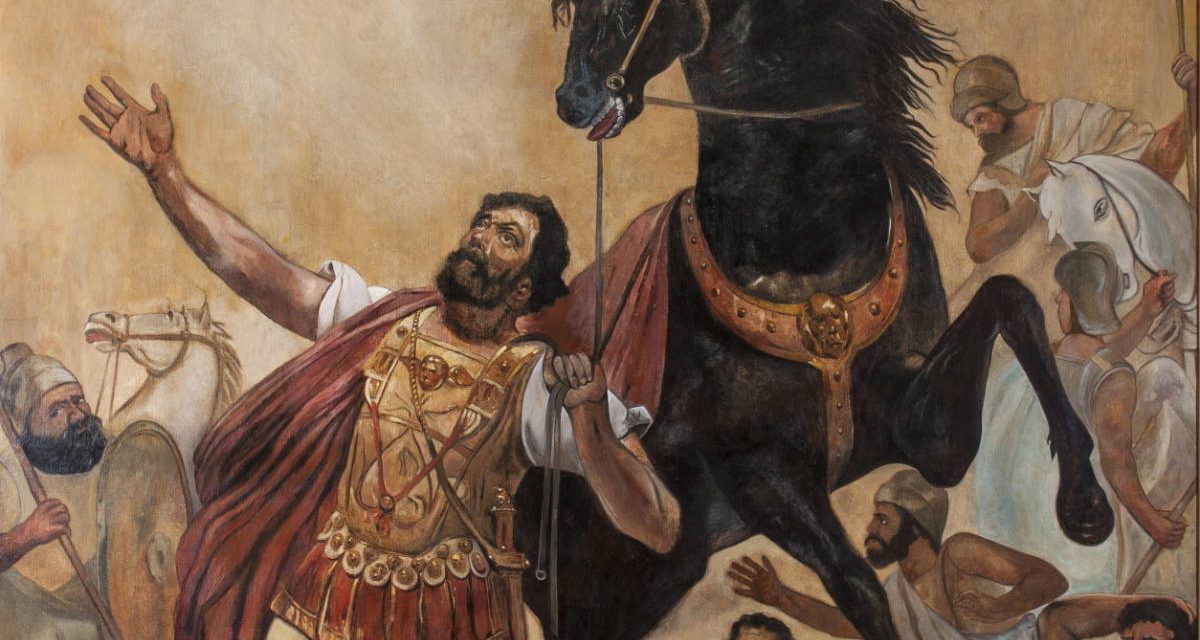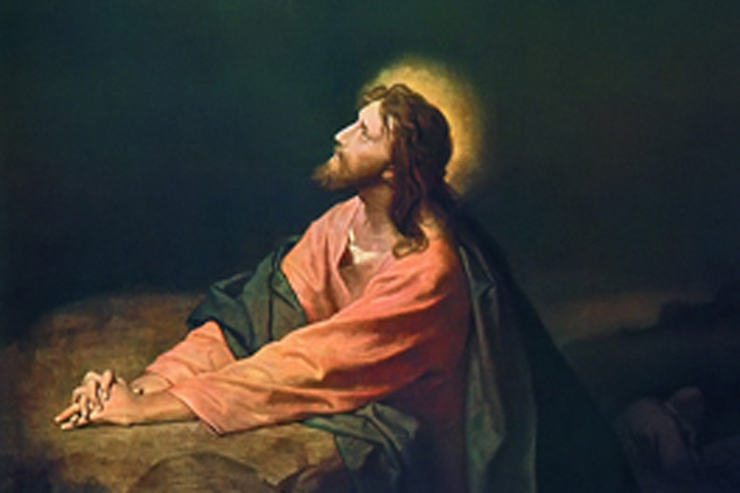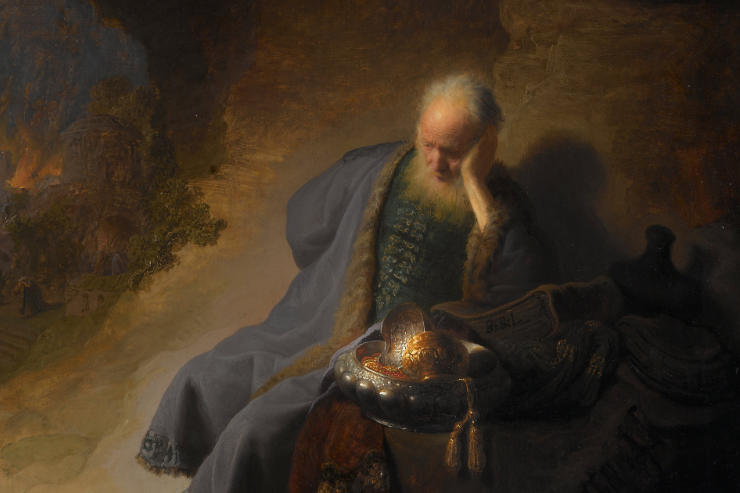What does it look like to be a follower of Jesus Christ? I would suggest that our participation in Holy Mass is at the center of our discipleship. But the answer does not end there.
Hopefully each of us come to Mass:
- to offer divine worship to our God,
- to receive him in Word and Sacrament, and then
- to go forth living and sharing the abundant life the Lord offers to us.
Today we are going to explore what it might look like to be fully engaged and actively participating in living our faith … that is, to be a fully alive disciple, rooted in Jesus Christ, reflecting his love and mercy in all the moments of our daily life.
I suspect that everyone here, at some level and on some occasion, has desired something more out of life. Ask yourself this question, “How might embracing the faith in this way be a game-changer for how I understand who I am, what I desire and how I live?”
Today is the fourth installment in our Gospel series focused on the Mass, the Eucharist, and the sixth chapter of John’s gospel.
Previously,
- We looked at the spiritual healing and forgiveness we can experience in the Mass beginning with the Penitential Rite.
- We reviewed how we encounter our Lord through hearing and listening to the proclamation of his Sacred Word.
- And we dove deeply into how we are to bring all we are and all we experience—our joys and sorrows, victories and defeats, our hopes and fears—and place them at the foot of the altar, joining our sacrifice to the Lord’s once for all sacrifice on his Cross at Calvary, made present to us in the Mass.
All these previous topics point to our deep engagement and participation at Mass. Today, we will examine what this active participation looks like both within and beyond the celebration of Mass.
First, let’s look at our active participation during Mass. Since we have spent three Sundays on different aspects of what this looks like, let’s look at what it is not.
Active participation in the liturgy is not primarily about external activism. Active participation is not about being an usher, greeter, lector, choir member, or serving in any other liturgical role. It is not our postures and gestures, although these should be the outward manifestations of our interior disposition
Active participation in the liturgy and beyond is first and foremost an interior receptivity to all the Lord desires to give to us. It is an active, intentional openness and disposition of the heart to the love of God, both the love we receive from God and the love we show to God and others.
This active participation in our faith goes beyond the liturgical celebration. At the end of each Mass, the deacon’s dismissal sends us out into the world to share the love of God and his good news with others. This mission on which we are sent is so crucial that the name we in the western church have given to this divine liturgy—the Mass—is taken from the Latin words of dismissal, “Ite missa est.”
The mission on which all of us as disciples are sent can be a challenge, right.
Our lives are so busy, there is so much competing for our limited time.
Many of you have demanding jobs and careers that consume much of your day and week. Our children are busy with school, sports, and other activities.
On top of all this, we are distracted by so many different things, especially social media and other current fads of the culture.
How do we fit God into all of this?
You know, our work should be an opportunity to grow closer to God. It should support our vocation… strengthen our family. All too often, we sacrifice our vocation, our spouse and children for the benefit of career.
I remember when my family was young. Between long hours at work and frequent travel out of town, I felt like I wasn’t home at all. My wife and I did the best we could, we thought.
I remember thinking after my son’s Confirmation, that we seemed to celebrate sports victories with more excitement than we did our kid’s sacramental milestones. Like sacrificing family for work, this approach is backwards. We set disordered priorities.
Thankfully, Cathy began to challenge me to become more present to the family and more engaged in our parish. To be a better dad, a better husband. To fulfill my baptismal promises.
In our second reading, St. Paul tells the members of the Church at Ephesus and us in Roswell also, that we should “Watch carefully how you live, not as foolish persons but as wise, making the most of the opportunity.”
He tells us not to be ignorant of who we are and why we are. I think this was one of my biggest breakthroughs. St. Paul exhorts us to drink in the Spirit of God and not to be attached to the things of this world.
Thanks be to God that while our children were still young, we began to question where we fit into all of this. Who were we? Why were we? Where were we supposed to be going? How were we to know the way? Where was God in all this? What’s my place in this adventure?
Knowing that I am not an accident of nature, knowing that God loves me and made me for a purpose, realizing that his love for me sustains me in life and guides me on this journey towards eternity changed everything for me.
Cathy and I made an intentional decision to follow him, to place him first and to make sure our children knew his love for them. This commitment to say yes to the Lord invited his grace into our daily lives and provided the knowledge, wisdom, and courage to be faithful to his purpose.
This encounter with the Lord equipped us to reset our priorities. God, and his plan for us, now came first. Everything else second.
Eventually this led to my hearing his call to serve all of you as his deacon.
While His grace makes this journey possible, the journey to heaven still goes through the cross, we still struggle and experience sorrow and suffering. But now this life has meaning.
This is symbolized by the very architecture of this church: from the baptismal font in the narthex, we begin our journey to heaven, down this center aisle with five emblems in the marble representing the five wounds of Christ from his passion and our suffering too, through the Cross and to our eternal home in heaven.
We are called to be his disciples. We must be intentional and not accidental. This is the pilgrimage we are on. This is what truly matters.
So, what does active participation outside the liturgy look like? A disciple who follows and obeys Jesus Christ is…
- A Person of Prayer – When you love someone you desire to be with them. Prayer, worship, word, and sacrament are opportunities to be with the One you love.
- A Person of Sacrament – The sacramental life of a disciple consists of special encounters with God that provide His grace through His Son by the power of the Holy Spirit to equip us, guide us, protect us, correct us, and console us. Jesus tells us in today’s Gospel that whoever receives him in Holy Communion has eternal life. He says, “whoever eats my flesh and drinks my blood remains in me and I in him.”
- A Person of Love and Service – One of our priorities should be to learn to love and live as God does. This is what we mean in our parish vision when we say we desire to reflect his love and mercy. When people see me, do they see the love of God?
- A Person of Testimony – The Lord reminds us that we who have received the gift of his love and mercy have a duty to share that love and mercy with others. Again, we are sent forth from this Mass into the world, loving and serving those God places in our life, sharing the gospel with them and inviting them to encounter their God.
The last point, to be a witness for Christ, might seem daunting, consider these examples.
- Just be kind and loving in all your encounters with others, And don’t hide the fact that your Catholic faith is what leads you to be this way.
- Don’t neglect simple things that are good and holy. For example, when out at a restaurant, say grace before your meal and include the sign of the Cross.
- When you are with someone and they express a struggle or need, ask if you can pray for them and for what you can pray. This opens so many doors and is a blessing to both of you.
- In all times, be joyful. Nothing attracts curiosity and trust as does joy.
Our great challenge is to live our life according to the faith we profess. We must not keep our faith private and practiced only here on Sundays. Beyond these walls, we must also allow our faith to inform how we live and behave at home, at work, at school, in the marketplace, and in the public square.
Saint Paul asks the Ephesians to make the most of this “opportunity, because the days are evil.” So are our days.
Are you ready to commit your life to Christ? I ask that you join me in prayer right now and each morning:
“Dear Lord, thank you for seeing me safely through the night and granting me the opportunity of another day. I want to be your disciple. I place all my trust in you. Fill me with your grace to know and understand how I am to serve you and the people you place in my care today and grant me the love and courage to do so. Amen.”
Into the deep…
The scripture readings during Holy Mass for the Twentieth Sunday in Ordinary Tine (Year B) are Proverbs 9:1-6; | Psalms 34:2-3, 10-11, 12-13, 14-; | Ephesians 5:15-20; | John 6:51-58;.
Image credit: “The Conversion of St. Paul” (detail) José Ferraz de Almeida Júnior, Public domain, via Wikimedia Commons
Please help spread the Gospel. Share Deacon Bickerstaff’s article with family and friends on Facebook and other social media.
We are grateful for your support…
We welcome both one-time and monthly donations. A monthly subscriber giving just $10 a month will help cover the cost of operating Integrated Catholic Life for one day! Please help us bring enriching and inspiring Catholic content to readers around the world by giving today. Thank you and may God Bless you for supporting the work of Integrated Catholic Life!













